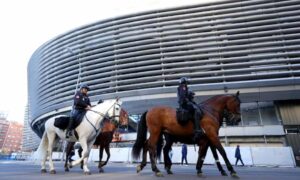
Police in Madrid and Paris have stepped up security before this week’s Champions League quarter-finals after an apparent threat from Islamic State (IS).
In London, the Metropolitan police said it had “a robust policing plan” in place for Tuesday’s match between Arsenal and Bayern Munich at the Emirates Stadium.
Although Spain’s interior ministry stressed the country’s terror alert remained at level four of five, it said 2,000 officers from the national police and Guardia Civil forces would be deployed to help municipal police patrol Real Madrid v Manchester City on Tuesday and Atlético Madrid v Borussia Dortmund on Wednesday.
“This deployment is being coordinated and supported by the state-wide measures established under the anti-terrorist prevention, protection and response plan,” the ministry said in a statement.
“The government and the state security forces have taken all relevant initiatives to guarantee the safety of participants and spectators at the two sporting events – as well as the safety of Spanish citizens as whole – so that they can go about their day-to-day business knowing that Spain is one of the safest countries in the world.”
France’s interior minister, Gérald Darmanin, said the security around Wednesday’s match in Paris between Paris Saint-Germain and Barcelona was being “considerably reinforced” after a “threat” from IS.
“We have seen, among other things, a communication from Islamic State that specifically targets the stadiums,” Darmanin said.
He pointed out that IS had called for “an attack on a sporting venue” about 10 days ago.
“All sports can be affected,” Darmanin added. “The prefect of police has considerably reinforced security resources [at Parc des Princes]. It goes without saying that, when it comes to important occasions like the football Champions League, we are discussing matters with our partners.”
France raised its security to the highest level, urgence attentat (attack emergency) after last month’s Moscow terrorist attack, in which 144 people were killed. IS claimed responsibility for the attack – a claim confirmed by US and French intelligence agencies.
British counter-terrorism sources were struggling to recall a previous time when IS had advertised that it intended to carry out attacks on a specific target and then carried it out.
What has been seen before is a threat to a high-profile event, such as New Year’s Eve celebrations, which failed to materialise but which, in IS’s eyes, provided a propaganda boost.
